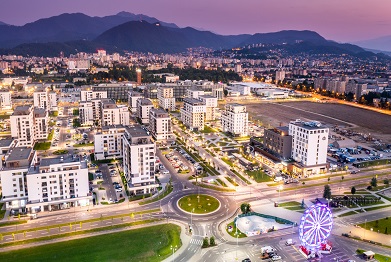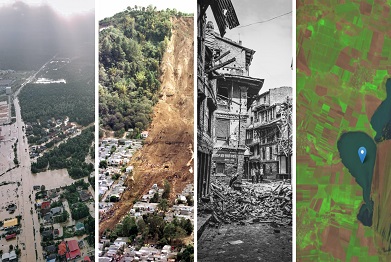Master's degree

The master’s degree field within which this study programme falls is Civil Engineering and Installations. The duration of studies is 2 years (120 ECTS credits). The students acquire skills in the design and execution of the consolidation and rehabilitation works for buildings, and in the energy modernization of the structures in the built environment. The completion of this study programme involves broadening the area of general competences and skills specific to the profession of civil engineer, but also other specializations closely related to the building sector: technical responsible for execution, chief civil engineer, or construction-assembly company manager, etc.
Curriculum: BIM Concepts in Civil Engineering, Evaluation of the reliability of structures in the concept of design for sustainability, Advanced structural analysis with finite element, Composite materials used in constructions, Improvement of the foundation land and rehabilitation and consolidation of the construction infrastructure, Modern prestressed concrete structures, Stability and elements of nonlinear calculation of structures, Rehabilitation and strengthening of reinforced concrete structures, Rehabilitation and strengthening of wooden and masonry structures, Rehabilitation and strengthening of metal structures, Steel structures for high-rise buildings and special constructions
Perspectives after graduation:The engineers are employable in design and execution companies. They can also conduct their activity in county councils and town halls, specifically in the technical offices for the authorization of buildings, as well as in companies that own heritage buildings.

The master's degree program Project Management in Urban Regeneration (in English) involves expanding the area of skills and general abilities characteristic of the profession of civil engineer, but also other specializations closely related to the construction sector (management and economic evaluation of real estate projects, developments and investments, urban development and planning, etc).
The study program is a strong interdisciplinary one and offers key qualifications and competencies for national and international organizations that aim at project management in the field of urban regeneration. The program also aims to contribute to the harmonious and sustainable development of Romanian cities by building a fund of knowledge and skills that will allow the professionals involved to coordinate effective projects for the benefit of communities.
After completing the two-year program, graduates will be able: to provide consulting in engineering design, to understand and plan civil engineering projects that meet certain requirements, including awareness of non-technical considerations - social, economic, industrial, environmental, health and safety at work, to analyze the financial and / or social costs and benefits of a project or investment in construction, to understand and to apply the principles of territorial systematization and urban planning, to coordinate the activities of several construction work teams, to negotiate and manage contracts and agreements, to develop and update documents related to the planning and implementation of new construction or renovation / rehabilitation projects, including information related to security systems and accounting documentation, etc.
Perspective after graduation: graduates of this master's program can work as project managers in construction, in companies, specialized consulting offices, government institutions.
- Syllabus

The Natural Hazards and Risk Assessment in Civil Engineering master degree study programme offered by Transilvania University of Brasov, Civil Engineering Faculty has a strong international orientation. It is split into three parts focusing on the most common geohazards: flood, landslide and earthquake.
After completing the two-year program, you are able to: in-depth knowledge and understanding of the concepts of hazard, vulnerability, risk and methods of integrated risk analysis and management; the ability to identify, formulate and solve specific engineering problems and to choose and apply the most appropriate and relevant methods for solving the identified problems; the ability to carry out bibliographic studies, consult and critically use scientific databases and other sources of information, and to use appropriate techniques to define, plan and carry out a research project in the field of research; critical awareness of economic, organizational and management issues (such as project management, risk and change management); communicate effectively, in writing, ideas and arguments on natural risk and hazards to both the general public and experts; the ability to operate effectively in a national and international context, as members or leaders of a team that may be composed of different disciplinary areas and levels, and that may use virtual communication tools; to carry out a further study autonomously, individually.
Perspective after graduation: Graduates may find employment in engineering design and consulting offices, construction companies, agencies of civil protection, governmental institutions, regional authorities, management offices, international organizations, insurance and reinsurance companies, research institutions.
- Curriculum
- Syllabus

The Master’s degree programme in Restoration and Conservation of the Built Heritage (taught in English) expands the range of professional competencies and skills specific to the civil engineering field, as well as to other specializations closely related to heritage preservation, urban regeneration, architecture, management and economics. The programme has an interdisciplinary approach, combining technical, architectural, legal and managerial perspectives and aims to prepare highly qualified specialists capable of evaluating, restoring, conserving and promoting historical and cultural heritage buildings and sites.
Graduates will acquire the ability to assess the condition of heritage structures, identify pathologies and their causes, propose and implement intervention solutions, apply relevant legislation and technical standards, manage restoration projects and use digital tools for documentation and analysis. The programme also focuses on understanding the cultural and historical significance of heritage assets and on applying sustainable principles in their conservation and adaptive reuse.
The Master’s programme falls within the field of Civil Engineering and Installations, and the language of instruction is English.
Perspectives after graduation: graduates can work as restoration engineers, heritage conservation consultants, project managers in heritage restoration, experts for local or international organizations involved in cultural heritage protection, or in governmental, non-governmental, and private institutions specializing in the rehabilitation and valorization of the built heritage.

The master’s degree field within which this study programme falls is Civil Engineering and Installations. The duration of studies is 2 years (120 ECTS credits). The main aim of the master’s degree programme is to prepare graduates for a career that requires a high degree of specialized knowledge, and is designed to cover a variety of disciplines, from the conception, design and optimization of building installation systems, to the proposal of measures to achieve buildings with low energy consumption and is therefore an important advance in the education of students in the field of Installation Engineering.
Curriculum: NZEB concept in facility design, NZEB integrated sanitary systems, Heating systems for passive and NZEB houses, Facility design in BIM (Building Information Modelling), Simulation of energy consumption in building design, Ventilation/air conditioning systems for passive houses and NZEB, Electrical and lighting systems with low energy consumption, Centralized energy production systems in the urban environment, Modern thermal networks in the urban environment, Monitoring of energy consumption in the urban environment, Superior energy utilization in the urban environment, Use of renewable energy sources in buildings, Building Energy Management (BMS), Analysis of resources and energy use in constructions, Project management and installation works for constructions
Perspectives after graduation: The engineers are employable in design and execution companies. They can also conduct their activity in county councils and town halls, specifically in the technical offices for the authorization of buildings, as well as in companies that own heritage buildings.